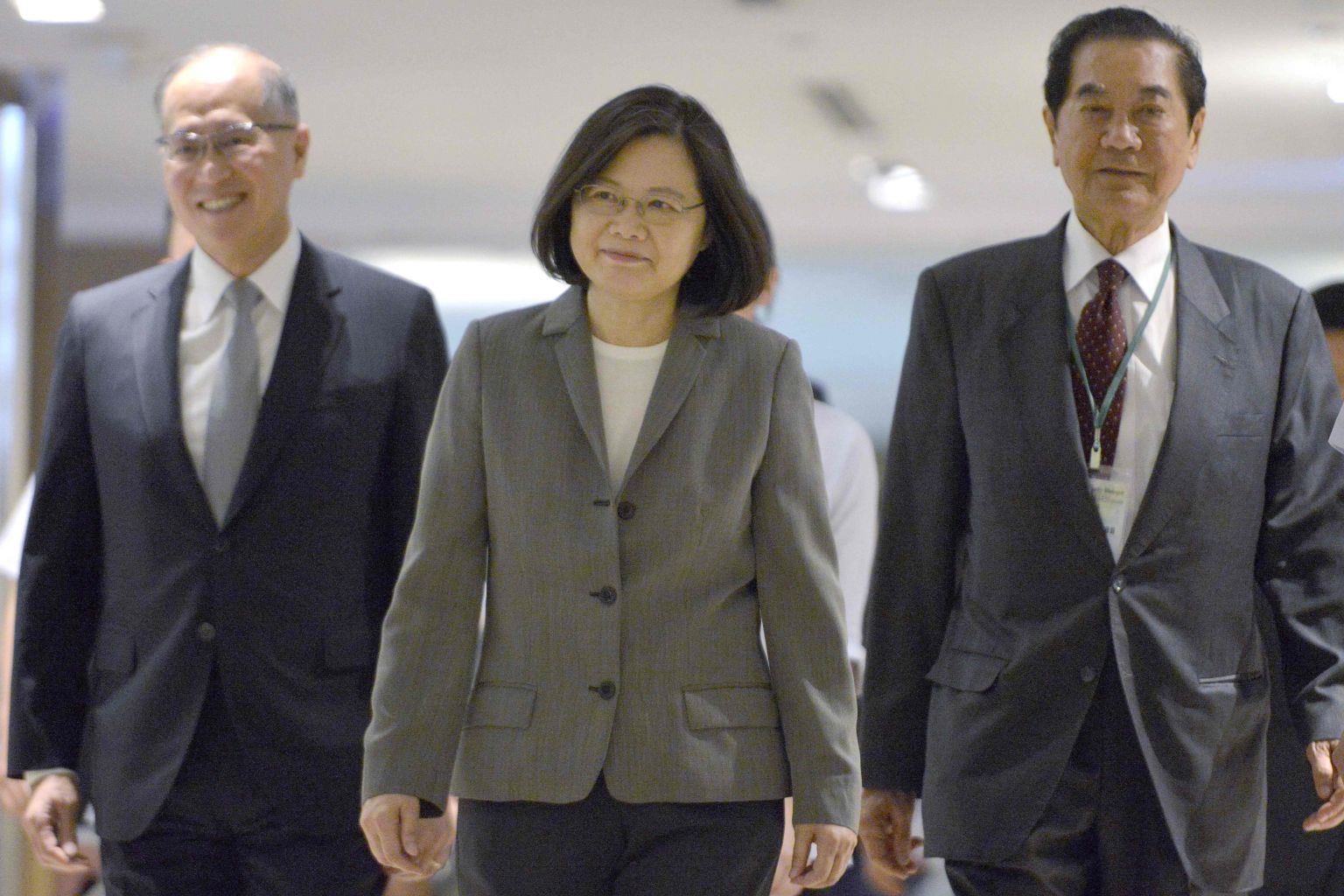Chief of Taiwan gas supplier CPC resigns after power blackout
Sign up now: Get insights on Asia's fast-moving developments

Taiwan's President Tsai Ing-wen (centre) is escorted by Foreign Minister David Lee (left) and Chairman of the Taiwan Prospective Foundation Chen Tan-sun while attending the Asia-Pacific Security Dialogue in Taipei, on Aug 8, 2017.
PHOTO: AFP
Follow topic:
TAIPEI (REUTERS, BLOOMBERG) - The chairman of Taiwan gas supplier CPC Corp resigned on Friday (Aug 18), three days after a power blackout hit businesses and homes across the island, affecting nearly seven million households.
The resignation of chairman Chen Chin-te, announced at a company news conference, comes after the island's minister for economics affairs, Mr Lee Chih-Kung, stepped down.
Mr Chen said the CPC Corp had investigated the blackout and shared findings with the government this week, pointing out directions for reform. Details of the findings could be made public later, he said.
Mr Chen emphasised that the company would need to work on ensuring routine protection and maintenance work was implemented according to plan. "As so many people were impacted by this, I wanted to deeply express CPC Corp's apologies to the people, and of course as chairman, I have to accept responsibility," Mr Chen said.
The resignation of chairman Chen Chin-te, announced at a company news conference, comes after the island's minister for economics affairs, Mr Lee Chih-Kung, stepped down.
Mr Chen said the CPC Corp had investigated the blackout and shared findings with the government this week, pointing out directions for reform. Details of the findings could be made public later, he said.
Mr Chen emphasised that the company would need to work on ensuring routine protection and maintenance work was implemented according to plan. "As so many people were impacted by this, I wanted to deeply express CPC Corp's apologies to the people, and of course as chairman, I have to accept responsibility," Mr Chen said.
The blackout may force President Tsai Ing-wen to reconsider her anti-nuclear stance and open the country's electrical grid to outside investment, analysts said.
The island's energy security and the feasibility of Ms Tsai's plan to phase-out atomic reactors by 2025 and reduce coal-fired generation is coming under greater scrutiny, BMI Research said in an Aug 16 note.
So far, Ms Tsai has not backed down on promises to shut the country's remaining nuclear power stations, but public pressure could determine the extent to which policies change, according to Professor Gloria Hsu at National Taiwan University.
While the disruption resulted in about 9 per cent of Taiwan's generation capacity going offline, the outage highlighted the country's limited number of power plants.
The reliability of that supply, generated and distributed by state-run companies, is crucial to the success of Taiwan's semiconductor industry that had sales of about US$71 billion in 2015 and supplies companies including Apple.
"The government may be forced to reconsider its anti-nuclear stance," said Mr Joseph Jacobelli, an analyst at Bloomberg Intelligence. "Market liberalisation could be seriously advanced as Taiwan desperately needs private investment in its power infrastructure."
Taiwan plans to separate Taiwan Power, known as Taipower, into separate entities to handle power generation and transmission and distribution, according to electricity act amendments passed in January. But that effort is far too little and the government should should focus on more "rational and less populist" energy policies, said Mr Jacobelli.
Ms Tsai posted an apology on Facebook late on Tuesday and included a reiteration of her determination to push forward with phasing out nuclear power in favour of renewable energy.
The blackout was caused by "structural problems" and human error involving the replacement of equipment, which ultimately affected the operations of a state-owned Taiwan Power's power plant, state-owned gas supplier CPC Corp said this week.
The government said on Wednesday it was investigating the blackout on the heavily industrialised island amid sweltering heat. Officials said a task force would be set up to investigate the cause.
Tech companies reported little impact to operations, though some companies, such as ChipMOS Technologies, Advanced Semiconductor Engineering, and electronics manufacturer Foxconn, said they were affected.
Foxconn, formally known as Hon Hai Precision Industry, the world's largest contract electronics manufacturer and a major Apple supplier, said it experienced a blackout at its Tucheng facilities, but had back-up generators on site, according to a statement sent to Reuters late on Thursday.
Foxconn, formally known as Hon Hai Precision Industry, the world's largest contract electronics manufacturer and a major Apple supplier, said it experienced a blackout at its Tucheng facilities, but had back-up generators on site, according to a statement sent to Reuters late on Thursday.

